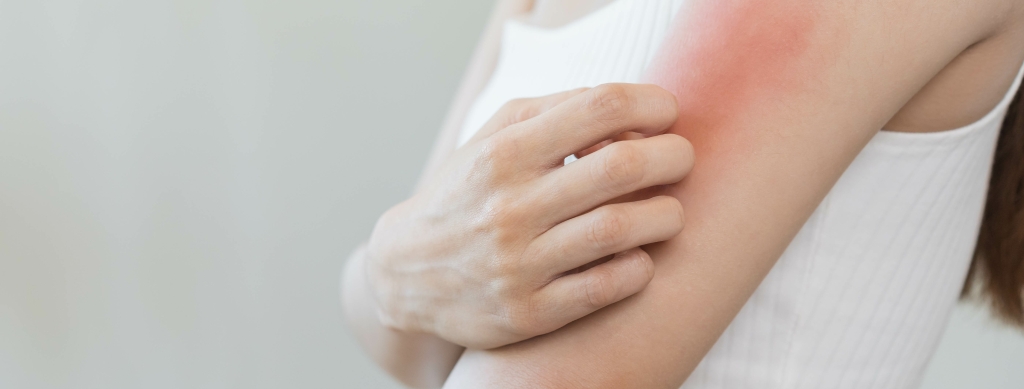Visit your local Allied Pharmacy to take advantage of our health services.

Simply, an insect bite is a rash, sting, or mark from an insect. In the UK, the most common types of bites are from creatures like bees, wasps, hornets, mosquitos, ticks, horseflies, midges, mites, and fleas.
Usually, at-home remedies can ease the symptoms of an insect bite. However, if the bite begins to look/feel worse or infected, you can now see a pharmacist for advanced advice and treatment.
What does an infected insect bite look like?
Each bite from an insect will look different. Some will look worse than others, and some can cause serious health implications, so it is important to understand what each insect bite looks like. No matter the insect your bite is from, if the bite starts to swell and feel painful it is likely it has become infected. Here is brief description of common insect bites:
A sting from either a bee, hornet or wasp will look like a small mark where the stinger has entered the skin. In some cases, the stinger can get stuck, so it is crucial you never pull it as you could potentially squeeze out the poison instead. Rather, brush the stinger sideways with your fingernail or with a bank card and wash the area with soapy water.
A mosquito bite typically appears as a small spot, causing the skin to raise. In addition, this spot will also become irritably itchy.
When you are bitten by a tick, the insect will still be attached to your skin. Therefore, you must use fine-tipped tweezers to carefully grab the tick as close to the skin and pull it upwards. Once you have gently removed the tick, dispose of it, and clean the bite with antiseptic or soapy water.
If your skin starts to show a rash that looks like a bullseye, it is likely you have caught Lyme disease, which can be caused by a tick bite. For this, visit your local pharmacy for treatment and advice.
Horsefly bites are uncomfortable and look unpleasant. These bites are large, painful and can sometimes bleed. Quite often a horsefly bite can be infected, so it is important to treat this bite as soon as possible.
Midge bites show up as small marks that cause the skin to raise in a form of clusters.
When bitten by a mite, itchy lumps will appear on the skin. Sometimes these lumps can develop into sore blisters.
Unlike any other bites, a flea bite will be found in group below the knees. These will appear as red marks and can feel lumpy.
Who can be affected?
Insect bites can happen to anyone at any given time, however those who spend their time engaging in outdoor activities like camping and hiking are at a higher risk. Getting an infection from an insect bite can occur when a bite or sting is not carefully removed, cleaned, or treated.
How to treat an insect bite before it becomes infected?
To lower the chance of an infection occurring, it is important to clear your skin first from any insect or stinger and wash yourself with soap and water. However, there are further at-home remedies you can do to lower the risk of an insect bite and to ease your symptoms:
If your bite has become infected, a pharmacist can best advise you on what medications would help ease your symptoms the best.
When does an infected insect bite go away?
In just a few days an insect bite or sting will start to improve and look better. However, an infected insect bite will need advice and treatment from a pharmacist, who can prescribe you with antibiotics or other medications that will increase and speed recovery.
Why do I need Pharmacy First?
Pharmacy First enables those with an infected insect bite in the UK, to receive immediate medical attention, advice and treatment from a pharmacist at their nearest pharmacy. At Allied Pharmacies, our pharmacists can advise and prescribe you with medications like painkillers, antihistamines, steroid creams and more to treat your infection.
This is service is accessible to anyone aged 1 years and older, providing quick and easy support to those wanting to avoid booking and waiting to see their GP.
Where do I go for help?
Wherever you are, whether it be at home or the park, you can easily find your nearest Allied Pharmacy on our website by typing in your postcode. Once you have entered in your location, our map will zoom in and show our nearest pharmacy to you. There is no need to worry about booking an appointment or giving us a heads up before your visit, as with Pharmacy First, our pharmacists will be ready to assist you.
89 Acklam Road, Middlesborough,
TS5 5HR
17 Green Lane, Tuebrook, Liverpool,
L13 7DT
91a Mesnes Street, Wigan,
WN1 1QJ